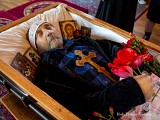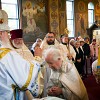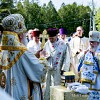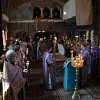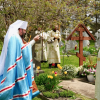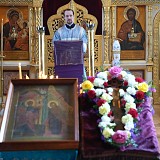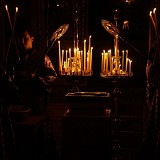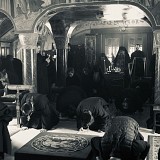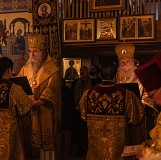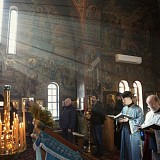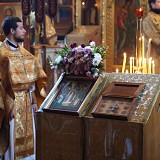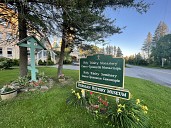On May 21 (New Calendar), on the feast of the Apostle and Evangelist John the Theologian, in the 103rd year of his life, the eldest inhabitant of the Holy Trinity Monastery, Lev Ivanovich Pawlinets, reposed quietly in hospital after a brief illness.
Lyovishka, as he was affectionately known, was born the year of the Communist revolution in Russia, in Moscow, in 1917. His parents were of the intelligentsia, his father being a lawyer. As did so many other thousands of Russians, who could not tolerate living in the “Paradise on earth,” his family left their homeland with General Wrangel in 1920, through the Crimea and found their way to Yugoslavia, where so many immigrants found a welcome refuge through the graces of King Alexander. At the same time, the synod of the Russian Orthodox Church Abroad, also was given refuge there, and one can state without exaggeration, that Lev’s life spanned the life of our Church Outside of Russia, his life actually being at the center of Church life, first in Belgrade, Serbia and ultimately in the Holy Trinity Monastery, here in Jordanville, New York.
Tragically, Lev’s father died young of tuberculosis, and about at the same time, Lev was stricken ill with meningitis. At the same time, his brother, who was a pilot, died in an accident. Due to this illness, Lev remained mentally underdeveloped, which of course affected him the rest of his life. His mother, Nadezhda, was not able to take care of him due to her difficult economic circumstances and sent him to the Monastery of St. Job of Pochaev in Ladomirova, Slovakia. He was placed by her on a train with a sign on his back, “To the monastery.” Fortunately, he arrived at the monastery, which had been founded by the ever-memorable Archbishop Vitaly in the 1920’s as a place of refuge for Russian Orthodox monks and which had become an important place of ascetic struggle and missionary work not only among the local peasantry, which was returning to their ancestral Orthodox faith after enforced uniatism, but also as a place of printing of Church books and literature.
Lev Ivanovich lived among the monks, and when the Red Army advanced on the area towards the end of World War II, Lev fled along with most of the fathers to Preshov, then Bratislava, and eventually to Germany. After the end of the war, the brotherhood in its majority found refuge in Switzerland. At the same time, the founder of Holy Trinity Monastery, was doing his utmost with the help of friends to have the fathers emigrate to America, to our monastery. In November, 1947, fourteen monks and lay brothers, including Lev Ivanovich, arrived in Jordanville and in the ensuing years immensely provided for the rapid expansion of the monastery through their labors, as well as the founding of Holy Trinity Seminary.
In our monastery, Lev Ivanovich’s main obedience was working in the cow barn. He labored there for around over forty years. Later, when the monastery sold its cows and shut down the dairy, he worked in the kitchen until he was no longer able to do physical work.
After the war, Lev Ivanovich’s mother, Nadezhda Pawlinets, became a nun in Novo Diveyevo, situated in Spring Valley, New York, being tonsured with the name of Nun Natalia. She reposed in the 1970’s. Lev would always ask people to pray for his mother’s soul.
In the last twenty years or so of Lev’s long life, when he was no longer able to do physical work, he passed his time talking to the monks, the seminarians and the many pilgrims of the monastery. For this reason, and due to his very long life at the center of church life, Lev was probably one of the best known people of our church, this despite his simplicity and foolishness. He often liked to recount how he knew Metropolitans Anthony, Anastassy and also Archbishop John of Shanghai and San Francisco. He actually knew him as “Misha,” and remembered when the future saint sold newspapers in Belgrade. He loved to imitate his voice as well as the voices of other well known hierarchs and personalities.
Lev Ivanovich rarely was ill. It seemed he would live forever. However, the last couple of weeks he did succumb to an infection. However, up until just a few days before he was hospitalized the final time, he was still sitting by the coffee urn and chatting with whoever passed by. He often loved to sit outside the seminary dorm to visit with the seminarians. Many generations of seminarians remember with affection his antics.
A few days before his repose, Lev was hospitalized with an infection, from which his elderly body could not recover. He was accompanied in the hospital by one of the senior hieromonks, who prepared him spiritually for his last journey. He fell asleep in the Lord around 4:30AM on May 21st. On the next day, on the feast of Mid-Pentecost and the Translation of the Relics of St. Nicholas, three bishops, including the primate of the Russian Orthodox Church Outside of Russia, Metropolitan Hilarion, and a multitude of priests, both of the monastery as well as visiting priests, even coming from Australia, and a large number of pilgrims and neighbors, accompanied Lev Ivanovich on his last path.
Our abbot, Bishop Luke, commented that this was truly an event typical of our Church Abroad. Where else would you have three bishops, including the primate, and so many clergy and faithful, serve and attend the funeral of someone who in the world’s eyes, was so lacking of what could be called social graces and attributes?
Those of us who have lived in the monastery for any length of time will sorely miss our Lyovishka, as he was such a personality for so many years and a real part of our history. May our Risen Lord provide Lev with eternal rest among the saints, including our reposed fathers and brethren in the Lord, and may his memory be eternal!
|
| |||||||||||||
